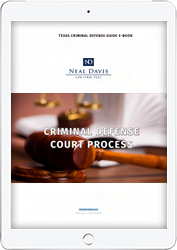
When Can I Sue for False Allegations of a Crime?
If you or a family member beat a false accusation of a sex crime or other offense, you may be wondering, “Can I sue for false allegations of a crime?”
Veteran Houston criminal defense lawyer Neal Davis has answers.
Rest assured, though, that an experienced defense attorney like Neal Davis can represent you in fighting your CRIMINAL charge. If you wish to pursue a CIVIL case, such as for defamation or slander, please consult with a civil attorney in that area as our firm focuses on criminal cases only.
Defamation of Character Lawsuit
Perhaps you were falsely accused of rape or some other sex crime which you didn’t commit, and as a result you suffered loss of employment, loss of standing in your community, and other damages. Provided no charges are outstanding against you, you may be able to file a defamation of character lawsuit.
Such a lawsuit can target a person who makes deliberate communication — oral or written — with an intent to harm your reputation. Your lawsuit must show that this person knew or should have known that their statements were false, but made them anyway in order to deliberately harm you.
A civil lawsuit for defamation of character via false allegations of a crime can come in two forms: slander and libel.
Slander and Libel
Civil lawsuits over slander or libel each target false statements which do harm to a person’s reputation. The difference is that slander involves oral or spoken statements made to a third party (someone other than yourself), while libel involves written, visual or Internet-based depictions which were published or publicly posted for others to read.
For slander, Texas law and federal law both provide civil penalties. To establish slander in a civil lawsuit, you must prove that someone made the accusations against you while knowing they were false and did so with the intent of hurting your job standing or reputation.
For libel, your civil lawsuit must prove that the written or printed accusations against you were false and were made in a willfully defamatory manner — that is, with malice and intent.
Whether slander or libel, a false accusation of a particularly serious crime may be considered by a court as an offense that is “actionable per se,” or “defamatory per se.” In other words, whether written or spoken, a false allegation against you of a serious crime, such as rape or murder, can be the basis of a defamation of character lawsuit in and of itself.
Your civil lawsuit over slander or libel can seek compensation for actual monetary losses caused by the false allegation. These can include attorney fees and loss of salary if the false claim caused you to lose your job.
A defamation of character lawsuit over libel or slander also seeks to compensate the plaintiff for damages regarding humiliation, embarrassment, and mental anguish after being falsely accused of a crime. Though these aren’t actual monetary losses, their value as damages can be calculated by an experienced attorney.
False Imprisonment or Malicious Prosecution Lawsuit
Your civil lawsuit over being falsely accused of a crime can also target false imprisonment or malicious prosecution.
To file a civil lawsuit over malicious prosecution, you must be able to hold someone liable for initiating a civil or criminal charge against you while being fully aware that the claims behind the charge were false or weren’t reasonably true, and had a wrongful purpose in being made.
Proving this wrongful purpose or improper motive behind a criminal charge is key to such a lawsuit. Your civil lawsuit cannot be based simply on the inadequacy of the evidence against you.
However, incompetent or negligent testimony by an expert witness can be grounds for a civil lawsuit in some cases. Again, you must receive a court ruling in your favor on the criminal charge before you can file a civil lawsuit against those whose responsible for malicious prosecution.
Keep in mind that a district attorney, assistant district attorney, and many other public officials may be entitled to immunity from lawsuits in such cases. However, your civil lawsuit for malicious prosecution or false imprisonment could target a private prosecuting attorney.
Criminal Charges Against Your Accuser
Independently of a civil lawsuit for false accusations of a crime, a criminal charge may also be made against someone who deliberately accused you of a crime they knew you didn’t commit with the intent of spurring wrongful prosecution and harm to your reputation.
That person may face their own criminal charge for a false accusation to law enforcement officers. In Texas and in other states, filing a false report of a crime is a crime in itself. In some cases, it’s a misdemeanor, and in others a felony.
Obtain Justice Through a False Allegations Civil Lawsuit
To fight back, you can get a lawsuit over false allegations of a crime by contacting the experienced criminal lawyers at the Neal Davis Law Firm. We will not only represent you in getting your criminal charge dismissed, but once you’ve been found innocent, we can help you fight back with a civil lawsuit seeking damages from false allegations.
In Montgomery County, Fort Bend County, Houston and the rest of Harris County, skilled criminal defense lawyer Neal Davis has fought for the legal rights of hundreds of persons, and he’s often succeeded in getting charges dropped or dismissed before trial.
Unlawful Restraint – The Definition
In Texas, there is a crime called unlawful restraint. Only a prosecutor can bring criminal charges. The definition of this crime is as follows:
(a) A person commits an offense if he intentionally or knowingly restrains another person.
(b) It is an affirmative defense to prosecution under this section that:
1. The person restrained was a child younger than 14 years of age;
2. The actor was a relative of the child; and
3. The actor’s sole intent was to assume lawful control of the child.
(c) An offense under this section is a Class A misdemeanor, except that the offense is:
4. A state jail felony if the person restrained was a child younger than 17 years of age; or
5. A felony of the third degree if:
(a) The actor recklessly exposes the victim to a substantial risk of serious bodily injury;
(b) The actor restrains an individual the actor knows is a public servant while the public servant is lawfully discharging an official duty or in retaliation or on account of an exercise of official power or performance of an official duty as a public servant; or
(c) The actor while in custody restrains any other person.
(d) It is no offense to detain or move another under this section when it is for the purpose of effecting a lawful arrest or detaining an individual lawfully arrested.
(e) It is an affirmative defense to prosecution under this section that:
6. The person restrained was a child who is 14 years of age or older and younger than 17 years of age;
7. The actor does not restrain the child by force, intimidation, or deception; and
8. The actor is not more than three years older than the child.
“Neal was hired as a defense attorney on a charge that was unjust and false. He listened to my story and said he could help. Long story short and three years later, all charges were dropped, and my arrest record was ordered expunged. During that three years and several court appearances, Neal was ready and prepared each time for the trial. The state delayed the trial many times to gain an upper hand as did Neal when the situation was one sided for the state. Each time you are charged with a crime, it is a gamble on the outcome. But like a gambler, you got to know when to hold them, know whem to fold them. Neal plays cards very well. I didn’t know Neal before hiring him, however, over the three years, I consider him a friend and shoot him an email now and then to see how he is doing. If you’re in trouble, call Neal. He will use all that he knows and has learned over his many years as an attorney to help you resolve your concerns.”
Criminal Defense Court Process
FREE E-BOOKLearn all about the legal process and your legal rights.

